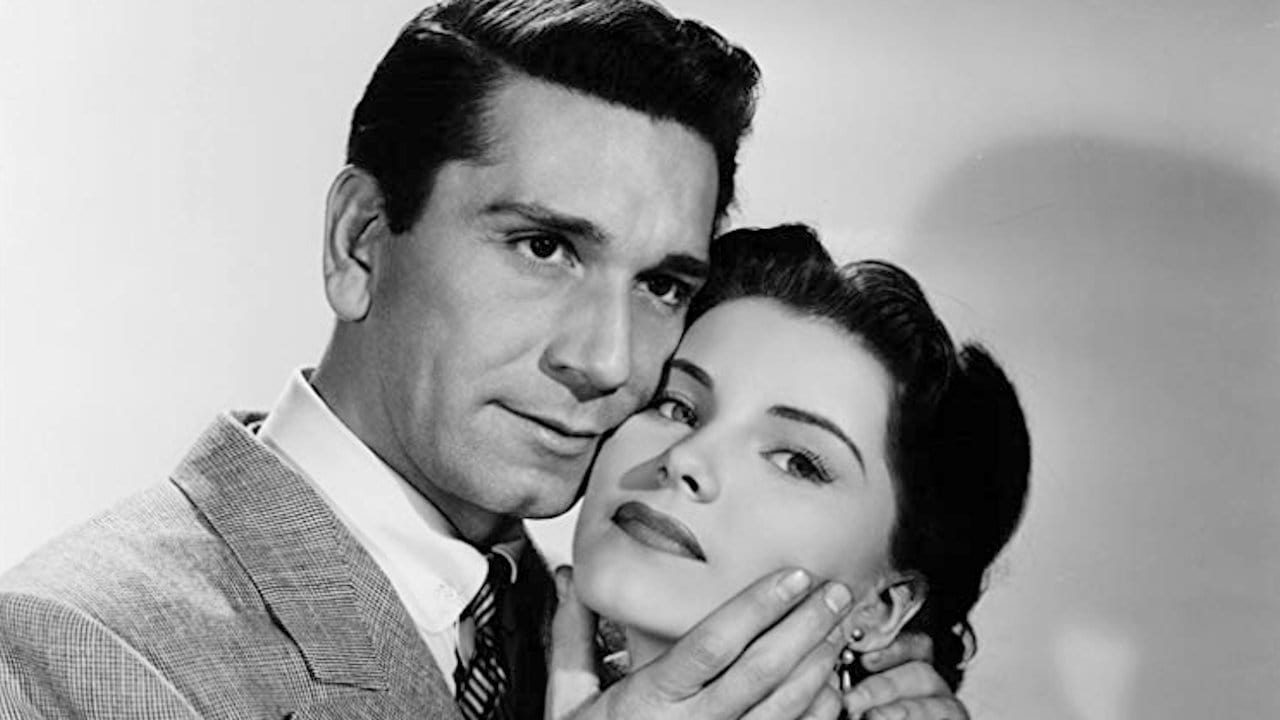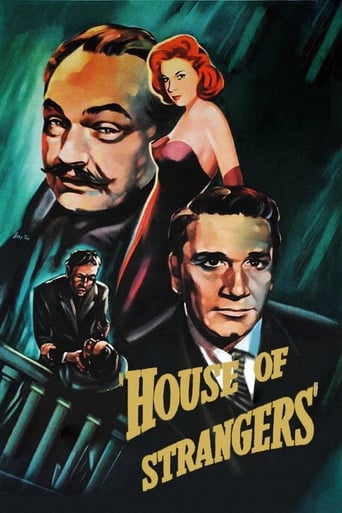

SERIOUSLY. This is what the crap Hollywood still puts out?
... View MoreAn absolute waste of money
... View MoreThis is one of the few movies I've ever seen where the whole audience broke into spontaneous, loud applause a third of the way in.
... View MoreIt really made me laugh, but for some moments I was tearing up because I could relate so much.
... View MoreIf you're not told House of Strangers is an Italian-American reboot of King Lear, you might not catch on. But once you figure it out, the similarities will be extremely apparent. Starring Edward G. Robinson, a man's family dynamic is in jeopardy as his four sons, Richard Conte, Luther Adler, Paul Valentine, and Efrem Zimbalist, Jr., grow up and turn against each other.If you're an Edward G. Robinson fan, you'll definitely want to rent this movie to see him in a very meaty role. He's larger than life, warm, strong, forceful, and as always, has a huge heart. If you're a Richard Conte fan, you'll also want to rent this movie. He usually plays a bad guy, but in this movie, he has the biggest part and it's clear from the get-go you're supposed to root for him. Everyone in the film has a natural chemistry together, and the explosive tempers make it very believable they're all one "happy" family. And if you'd liked this version, check out Broken Lance, another modern King Lear adaptation starring Spencer Tracy and Richard Widmark!
... View MoreProud stubborn Gino Monetti (Edward G. Robinson) runs his Little Italy bank his way, in fact he does everything his way including cajoling and humiliating his four adult sons. Working his way from a barber to a bank president he never took time to familiarize himself with rules and codes which soon runs him afoul of the law. Three of the sons see it as an opportunity for revenge while loyal son Max (Richard Conti) calls for a united front. They set Max up on a bribery charge and he goes to jail, the old man is ruined and the brothers take over. Released and having sworn a vendetta against his brothers they debate how to deal with him.In between his Oscar efforts Letter to Three Wives and All About Eve, Joseph Mankiewicz made this little gem about patriarchy and family turmoil where no one ends up unblemished. Pops Monetti is a tyrant to his kids without an ounce of sensitivity and while his three sons decide to let him take the fall it comes after a lifetime of abuse. The good son Max though loyal to his dad is willing to bribe as well as have a touch of the dad's arrogance by expecting girlfriend played by Susan Hayward to be his piece on the side given he is engaged.Robinson is outstanding as the thick headed self-absorbed patriarch who brooks no dissent that leads to his downfall. It is all the world according to him and Robinson brings it across without sympathy as he browbeats all around him, occasionally switching to Italian with flair, his coda "Never forget, never forgive" Conti as Max gives his usual intense clipped performance that matches up perfectly when shredding the brothers over their duty as children or being brought around by Hayward to a new way of thinking. Hayward is also impressive as the self assured, independent, passionate and total opposite of the stifled old world Italian women subject to berating while pledging silent allegiance. It is her goading of Max and his anachronistic principles that help motivate him to action. Luther Adler as vindictive brother Joe balances Conti's strong performance with one of his own in which he is both loathsome and at times sympathetic due to Monetti Sr. browbeating.With its updated Shakespearean overtones (King Lear) baroque setting (The Monetti home) and strong stark performances House of Strangers holds its own most of the way with the two Oscar winners that bookend it.
... View MoreThis is one of Joe Mankiewicz' lesser known films (birthday today 11.2) and definitely among his best ones. Edward G. Robinson performs at his best as the Italian father of a banking family with four brothers embroiled with each other, as usual in Mankiewicz's films a brilliant dialogue mesmerize you all through, Susan Hayward also making a splendid performance. Richard Conte plays the one son who acts honourably, while all the others turn against him and betray their father out of necessity to survive – and let Conte pay for it. When he is freed from prison (which is where the film begins, and we know nothing yet of what has passed), the immediate meeting with his brothers creates the suspense which lasts and constantly grows tighter through the entire film, until the conflict is resolved in the end after many unexpected turns. All actors are at their best, while the lasting impression is made by Conte as a paragon of straight Sicilian nobility, Susan Hayward as a surprising woman of superior character, and above all Edward G. Robinson as the father, who although powerful and successful can't quite follow the new turns of his age. Although autocratic he never becomes unsympathetic, but you rather understand him and have to pity him - he is the tragedy, in a marvellously well-written film script (as all of Joe Mankiewicz' films are) perfectly handled by a masterful director and a set of actors together creating a virtuoso family performance.
... View MoreWhile this has nothing to do with the Arthur Miller play "All My Sons" that Edward G. Robinson starred in the film version of, he does play a father of four grown men whose resentment towards their father covers a variety of different reasons. Robinson is an Italian immigrant on New York's lower East Side who makes good as the founder of a bank. He runs his loan division with high interest rates and no collateral, and this makes him subject to an investigation by the Feds. Son Richard Conte, his absolute favorite, is resented by his three older brothers who feel worthless in their father's eyes. Robinsons' old school ideals don't mesh with American values, and some of his ruthless ways fall on each of them, causing impending violence between Conte and the others.This is a modern day Greek tragedy, and features interesting psychological study of each of the main characters. Susan Hayward is the top billed female as a sexy client of Conte's who ends up falling in love with her in spite of the fact that he is engaged to the pretty Diana Douglas. When the chips fall on Robinson because of his illegal banking activities, it is Conte who takes the plunge with them, and the brothers use this as an opportunity to get revenge on dad. Luther Adler, Paul Valentine and Efrem Zimbalist Jr. are the other brothers, and Esther Minciotti (the mother in "Marty") is Robinson's quiet, long-suffering wife who would rather have a simple life back in the old country rather than the rich life Robinson has given her. Right before her Oscar nominated role in "Caged", the large Hope Emerson gives a showy performance as Douglas's domineering Italian mama.The strongest performances are of course by Robinson (using a convincing Sicilian accent) and Conte. Esther Minciotti is amazing in her one strong scene where she unleashes her fury on her sons. The screenplay is powerful (later successfully re-adapted as the Western, "Broken Lance"), and Joseph L. Mankiewicz's direction is masterful. Beautifully filmed with a spooky look at the abandoned house all of the sons were raised in, "House of Strangers" is an absolute must see as a view of how power corrupts and how dynasties fall when they don't stick together.
... View More